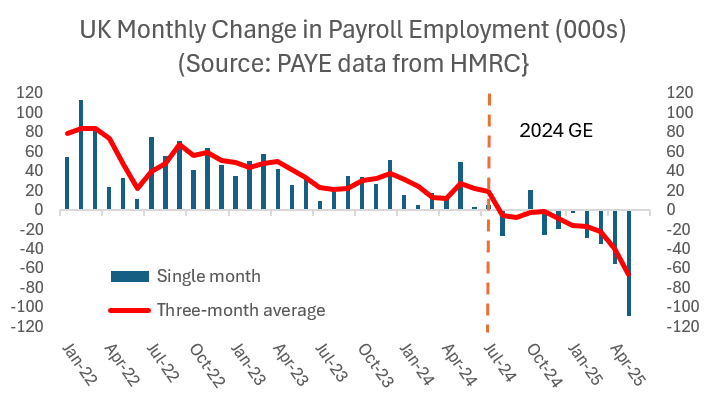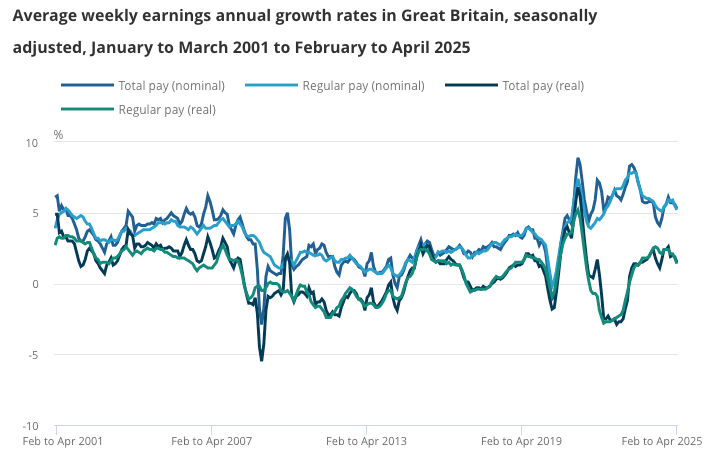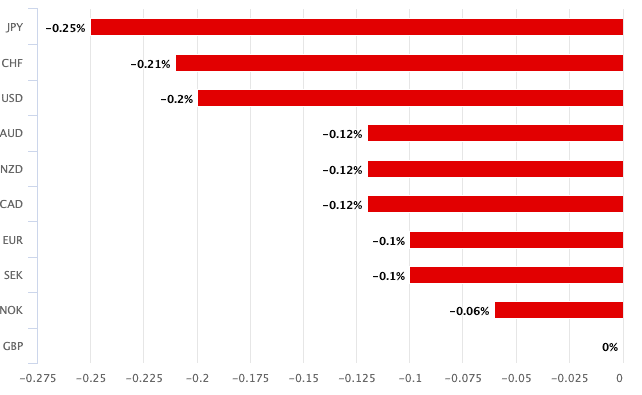
Image © Adobe Images
The British Pound was sold against the Euro, Dollar and all other majors after wage figures printed softer than expected.
UK wages (with bonuses included) rose 5.3% in April, said the ONS, which is below the 5.5% consensus expectation, but down on March's 5.6%. When bonsues were excluded, the figure stood at 5.2%, down from 5.5% (5.4% expected).
The unemployment rate rose to 4.6% from 4.5% after payrolled employees in the UK decreased by 78K (0.3%) in the three months to April. The more timely PAYE measure of employment showed a 109K drop in May alone, the biggest drop since the Covid crisis.
"Outside of the pandemic, one only needs to go back to the global financial crisis to see such a fall in payrolled employees," says Sanjay Raja, Senior Economist at Deutsche Bank.
Job vacancies fell by 63K (7.9%) on the quarter, to 736K in March to May 2025, making for the 35th consecutive quarterly decline. The number of unemployed people per vacancy was 2.2 in February to April 2025, up from 1.9 in the previous quarter.
These data point to a labour market that is steadily losing steam under pressure from the government's tax and minimum wage hikes that make it increasingly unattractive to hire staff and replace existing roles.
"With rising national insurance costs, a higher minimum wage, and escalating global tariffs all contributing to heightened cost pressures for employers, today’s figures show that businesses are clearly feeling the squeeze," says Paige Tao, economist at PwC UK.
Image courtesy of @julianHjessop
With businesses coming under pressure due to tax and regulatory changes, "jobs may have been the release valve for firms to deal with cost pressures," adds Deutsche Bank's Raja.
A deteriorating employment scene should bring wages down in the coming months, contributing to softer inflation trends in the medium term.
The Bank of England might feel it can cut interest rates again on two more occasions this year, based on these figures.
"This gradual cooling in pay growth may offer some reassurance to the Bank of England, following last month’s inflation reading unexpectedly jumping to its highest level in over a year," says Tao.
Heading into the data release, the market saw 35 basis points of cuts being delivered by the Bank during the remainder of the year, which is effectively one-and-a-half cuts. The pricing has increased following the report, putting two more cuts in contention.
The mechanical reaction of foreign exchange markets to such a shift is to sell Pound Sterling, which duly softened following the report:
The Pound to Euro exchange rate had dropped to 1.1822 by mid-morning trade, having been at 1.1870 at the time of the release. The Pound to Dollar exchange rate fell to 1.3468 from 1.3540.
Above: GBP was down against all major rivals following the labour market report.
"This latest batch of data should come as no surprise. Businesses have been burdened with not only a huge rise in their national insurance bills but also rising wage bills following the increase to the national minimum wage in April. Consecutive months of rising unemployment therefore were inevitable as businesses look to manage their costs in the face of fiscal pressure," says Isaac Stell, Investment Manager at Wealth Club.
Alex Hall-Chen, Principal Policy Advisor for Employment at the Institute of Directors, says the business case for hiring new staff has been dealt a series of blows.
These blows include the recent hike to employer National Insurance Contributions, above-inflation increases to the National Living Wage, and the sweeping changes to employment law coming down the track from the Employment Rights Bill.
"Our own data shows that the measures contained in the Employment Rights Bill have made almost half (49%) of business leaders less likely to hire new staff and a third (36%) more likely to outsource roles to other countries," says Hall-Chen.



